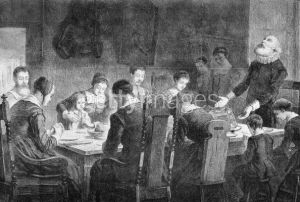 Emerging from the tryptophan-induced lethargy of Thanksgiving and the fleeting stimulus of Black Friday sales stampedes I’m reflecting on two lost lessons of the first Thanksgiving and the people who celebrated it, the Puritans.
Emerging from the tryptophan-induced lethargy of Thanksgiving and the fleeting stimulus of Black Friday sales stampedes I’m reflecting on two lost lessons of the first Thanksgiving and the people who celebrated it, the Puritans.
- The Puritan understanding of deferred gratification. Most observers credit the Puritan wrok ethic and their understanding of deferred gratification as key foundations of American success through the centuries (and missing elements in today’s culture). Fareed of CNN addresses this topic this good video commentary:
2. The pilgrimage to capitalism. Rush Limbaugh tells the fascinating story of the Pilgrims flirtation with—and ejection of—socialism, part of the original Mayflower Compact. Living in community didn’t work. As William Bradford wrote:
“‘For this community [so far as it was] was found to breed much confusion and discontent, and retard much employment that would have been to their benefit and comfort. For young men that were most able and fit for labor and service did repine that they should spend their time and strength to work for other men’s wives and children without any recompense,'” without being paid for it, “‘that was thought injustice.’ Why should you work for other people when you can’t work for yourself?” That’s what he was saying. ” The Pilgrims found that people could not be expected to do their best work without incentive. So what did Bradford’s community try next? They unharnessed the power of good old free enterprise by invoking the undergirding capitalistic principle of private property.
“Every family was assigned its own plot of land to work and permitted to market its own crops and products. And what was the result? ‘This had very good success,’ wrote Bradford, ‘for it made all hands industrious, so as much more corn was planted than otherwise would have been.’ … Is it possible that supply-side economics could have existed before the 1980s? Yes. Read the story of Joseph and Pharaoh in Genesis 41. Following Joseph’s suggestion (Gen 41:34), Pharaoh reduced the tax on Egyptians to 20% during the ‘seven years of plenty’ and the ‘Earth brought forth in heaps.’ (Gen. 41:47) In no time, the Pilgrims found they had more food than they could eat themselves.
